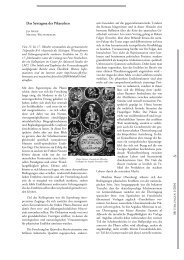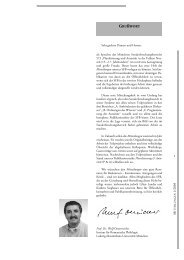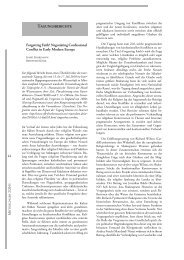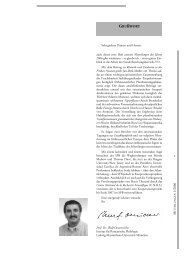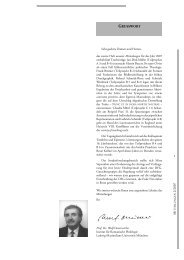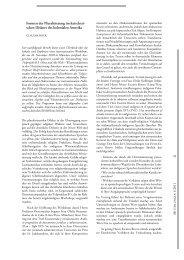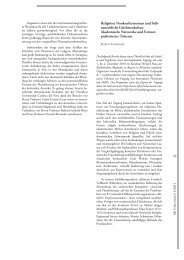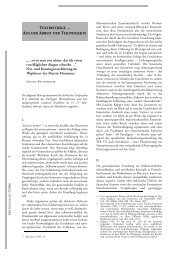Mitteilungen 2-2011_final.fm - SFB 573 - Ludwig-Maximilians ...
Mitteilungen 2-2011_final.fm - SFB 573 - Ludwig-Maximilians ...
Mitteilungen 2-2011_final.fm - SFB 573 - Ludwig-Maximilians ...
Sie wollen auch ein ePaper? Erhöhen Sie die Reichweite Ihrer Titel.
YUMPU macht aus Druck-PDFs automatisch weboptimierte ePaper, die Google liebt.
22<br />
MITTEILUNGEN 2/<strong>2011</strong><br />
access to writing determines one’s position and privileges<br />
in the social hierarchy just as it allows one to determine<br />
historical memory in one’s favour. Each time<br />
the power of writing is evoked in the play, it is<br />
shadowed by an anxiety about the power over writing.<br />
Already at the very outset of the play, the peace contract<br />
which the Duke of Suffolk has negotiated with<br />
France à propos the marriage of King Henry VI and the<br />
French princess Margaret and which results in the loss<br />
of two continental territories opens up the two dimensions.<br />
The written document’s performative power is<br />
considerable: it establishes peace, transfers territories<br />
and memorializes these steps as part of national history.<br />
Interestingly, this is presented as an act of remembering<br />
as well as of forgetting. Outraged by the terms of the<br />
treaty, the Duke of Gloucester sounds a patriotic lament:<br />
O peers of England, shameful is this league;<br />
Fatal this marriage, cancelling your fame,<br />
Blotting your names from books of memory,<br />
Razing the characters of your renown,<br />
Defacing monuments of conquered France,<br />
Undoing all, as all had never been! (1.1.95–100)<br />
The contract blots out the memory of England’s glorious<br />
victories, won by Henry V just a generation before,<br />
and reinscribes shame instead. The result is a realignment<br />
of political, national and geographical memory<br />
which is explicitly couched in the language of oblivion:<br />
cancelling, blotting, razing, defacing, undoing are the<br />
operative verbs here, which suggests that forgetting is<br />
seen as an active force. Moreover, this forgetting is not,<br />
as Eco would have it, an uncontrollable, catastrophic<br />
force of nature; on the contrary, it is brought about<br />
through the ritualized social practices of a marriage and<br />
a peace contract. While the scene thus affirms the power<br />
of this piece of writing, it criticizes at the same time that<br />
Suffolk has shamefully abused his power over its terms.<br />
Such an awareness of the potential abuses of the power<br />
over writing necessarily qualifies the value of historical<br />
records themselves. Only a few lines after Gloucester’s<br />
lament, York, who rejects the marriage contract for far<br />
more selfish reasons, explicitly references chronicle<br />
sources to lend authority to his position: »I never read<br />
but England’s kings have had / Large sums of gold and<br />
dowries with their wives« (1.1.125 f.). And in 2.2., a<br />
scene whose recitation of genealogical trees is taken directly<br />
from Hall, Holinshed and Stow, the phrase »As I<br />
have read« (2.2.40) is supposed to lend credibility to<br />
Salisbury’s support, pace the chronicles, of York’s claim<br />
to the throne. These scenes affirm the belief in the power<br />
of written history and speak about its political uses for<br />
legitimating political authority. That York is the archvillain<br />
of the play foregrounds the fact that this authority<br />
is not necessarily coupled with justice or truth.<br />
The nobility’s abuse of their absolutist power is<br />
further showcased when several commoners produce<br />
petitions in which their grievances and calls for justice<br />
are recorded. »Let’s stand close«, urges one of the petitioners,<br />
»My lord Protector will come this way by and<br />
by, and then we may deliver our supplications in the<br />
quill« (1.3.1–3). Yet instead of the »good man«, Duke<br />
Humphrey, it is the Queen and Suffolk who appear.<br />
Much less inclined to protect the commoners’ interests<br />
than their own, they are biased judges. The Queen<br />
spitefully tears up a supplication because it is directed to<br />
the Lord Protector as the most powerful arbiter of the<br />
realm instead of to the king or herself (38–42). Suffolk<br />
even stand accused himself: one of the petitions is<br />
»Against the Duke of Suffolk, for enclosing the commons<br />
of Melford« (20 f.) and another promises to<br />
disclose a usurper, which prompts a suspiciously nervous<br />
reaction from Suffolk: exclaiming »Who is there?«,<br />
he »[Snatches Peter’s supplication]« and orders the petitioner<br />
to be arrested (33–36). Unjustly appropriating<br />
and destroying supplications, the nobles exert here an<br />
arbitrary power over the written word. One might argue<br />
that this scene shows writing as an instrument of domination:<br />
the commoners are forced to submit their petitions<br />
in written legal form, »in the quill«, which would<br />
have involved the costly services of a clerk. While this is<br />
undoubtedly true, I would argue that it also shows the<br />
power of writing as an instrument in the hands of the<br />
commoners: having entered the legal process, their supplications<br />
become official documents that have the<br />
power to indict members of the nobility. That the petitioners<br />
submit them »in the quill« also means that they<br />
do so »in a body; in concert; together«, which evokes an<br />
image of solidarity among the lower classes. 1 That the<br />
quill as an instrument of writing can become a weapon<br />
of rebellion in the hand of the lower classes is proleptically<br />
suggested by the first description we get of Cade.<br />
In 3.1., the Machiavellian villain York sounds Cade’s<br />
potential as an instrument for his stage-managed rebellion<br />
by recalling how in an earlier uprising, he »fought<br />
so long till that his thighs with darts / Were almost like<br />
a sharp-quill’d porpentine« (3.1.362 f.). Darts become<br />
quills, but the bows from which they were shot are actually<br />
those of the rebellious Irish kerns (light foot<br />
soldiers), while Cade fought on the side of the English<br />
colonial masters, just as his own rebellion in the play<br />
will be master-minded by a member of the English nobility.<br />
The politics of writing are therefore presented as<br />
highly ambiguous: the word, proverbially mightier than<br />
the sword, can be seized by those in power as well as the<br />
underprivileged classes. It is not clearly associated with<br />
either but is an instrument in the struggle for power.<br />
Having learned from painful experience that political<br />
power can be derived from power over the written<br />
word, the rebels also try to make the power of the<br />
written word work for them. Their efforts, however, fail<br />
1. The OED cites 2 Henry VI as the first recorded example for<br />
meaning 2.) »in the (or a) quill: in a body; in concert; together.<br />
to jump in quill: to act simultaneously or in harmony.«



